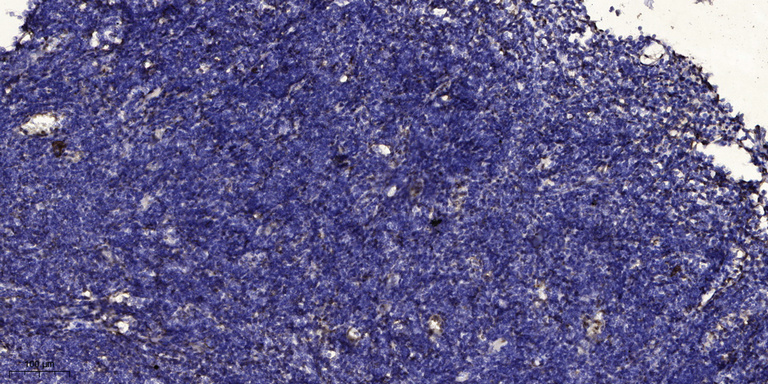MIP-3β Polyclonal Antibody
- Catalog No.:YT2766
- Applications:IHC;IF;ELISA
- Reactivity:Human;Mouse
- Target:
- MIP-3β
- Fields:
- >>Cytokine-cytokine receptor interaction;>>Viral protein interaction with cytokine and cytokine receptor;>>Chemokine signaling pathway;>>NF-kappa B signaling pathway
- Gene Name:
- CCL19
- Protein Name:
- C-C motif chemokine 19
- Human Gene Id:
- 6363
- Human Swiss Prot No:
- Q99731
- Mouse Swiss Prot No:
- O70460
- Immunogen:
- Synthesized peptide derived from MIP-3β . at AA range: 20-100
- Specificity:
- MIP-3β Polyclonal Antibody detects endogenous levels of MIP-3β protein.
- Formulation:
- Liquid in PBS containing 50% glycerol, 0.5% BSA and 0.02% sodium azide.
- Source:
- Polyclonal, Rabbit,IgG
- Dilution:
- IHC 1:100 - 1:300. ELISA: 1:40000.. IF 1:50-200
- Purification:
- The antibody was affinity-purified from rabbit antiserum by affinity-chromatography using epitope-specific immunogen.
- Concentration:
- 1 mg/ml
- Storage Stability:
- -15°C to -25°C/1 year(Do not lower than -25°C)
- Other Name:
- CCL19;ELC;MIP3B;SCYA19;C-C motif chemokine 19;Beta-chemokine exodus-3;CK beta-11;Epstein-Barr virus-induced molecule 1 ligand chemokine;EBI1 ligand chemokine;ELC;Macrophage inflammatory protein 3 beta;MIP-3-beta;Small-inducible
- Molecular Weight(Da):
- 11kD
- Background:
- This antimicrobial gene is one of several CC cytokine genes clustered on the p-arm of chromosome 9. Cytokines are a family of secreted proteins involved in immunoregulatory and inflammatory processes. The CC cytokines are proteins characterized by two adjacent cysteines. The cytokine encoded by this gene may play a role in normal lymphocyte recirculation and homing. It also plays an important role in trafficking of T cells in thymus, and in T cell and B cell migration to secondary lymphoid organs. It specifically binds to chemokine receptor CCR7. [provided by RefSeq, Sep 2014],
- Function:
- function:May play a role not only in inflammatory and immunological responses but also in normal lymphocyte recirculation and homing. May play an important role in trafficking of T-cells in thymus, and T-cell and B-cell migration to secondary lymphoid organs. Specifically binds to chemokine receptor CCR7. Recombinant SCYA19 shows potent chemotactic activity for T-cells and B-cells but not for granulocytes and monocytes.,online information:CCL19 entry,similarity:Belongs to the intercrine beta (chemokine CC) family.,tissue specificity:Expressed at high levels in the lymph nodes, thymus and appendix. Intermediate levels seen in colon and trachea, while low levels found in spleen, small intestine, lung, kidney and stomach.,
- Subcellular Location:
- Secreted.
- Expression:
- Expressed at high levels in the lymph nodes, thymus and appendix. Intermediate levels seen in colon and trachea, while low levels found in spleen, small intestine, lung, kidney and stomach.
CCL19 has potential to be a potential prognostic biomarker and a modulator of tumor immune microenvironment (TIME) of breast cancer: a comprehensive analysis based on TCGA database IHC Human 1:300 breast carcinoma tissue/
- June 19-2018
- WESTERN IMMUNOBLOTTING PROTOCOL
- June 19-2018
- IMMUNOHISTOCHEMISTRY-PARAFFIN PROTOCOL
- June 19-2018
- IMMUNOFLUORESCENCE PROTOCOL
- September 08-2020
- FLOW-CYTOMEYRT-PROTOCOL
- May 20-2022
- Cell-Based ELISA│解您多样本WB检测之困扰
- July 13-2018
- CELL-BASED-ELISA-PROTOCOL-FOR-ACETYL-PROTEIN
- July 13-2018
- CELL-BASED-ELISA-PROTOCOL-FOR-PHOSPHO-PROTEIN
- July 13-2018
- Antibody-FAQs
- Products Images

- Immunohistochemical analysis of paraffin-embedded human tonsil. 1, Antibody was diluted at 1:200(4° overnight). 2, Tris-EDTA,pH9.0 was used for antigen retrieval. 3,Secondary antibody was diluted at 1:200(room temperature, 30min).



